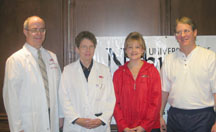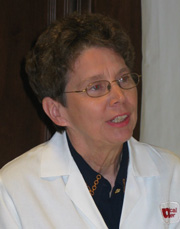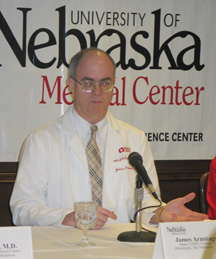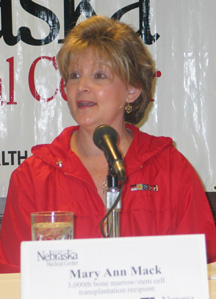 |
Participants in a news conference Friday, marking the 3,000th stem cell/bone marrow transplant at UNMC, were, from left, James O. Armitage, M.D., dean of the UNMC College of Medicine; Anne Kessinger, M.D., professor in the section of oncology/hematology; Mary Ann Mack, the 3,000th transplant patient; and Mike Mack, her husband. |
It almost sounds like a new car warranty. But – for the University of Nebraska Medical Center and its clinical hospital partner, The Nebraska Medical Center – it represents a significant milestone in the treatment of cancer patients who come to Omaha from all over the world.
On July 3, the medical center oncology/hematology staff performed its 3,000th bone marrow/peripheral stem cell transplant. Mary Ann Mack, a 45-year-old from Harshaw, Wis., was the recipient of a stem cell transplant.
Mary Ann and her husband, Mike, were recognized Friday at a news conference at the medical center. They were joined by James Armitage, M.D., dean of the UNMC College of Medicine and the person who started the transplant program 20 years ago, and Anne Kessinger, M.D., the UNMC oncologist who pioneered the use of peripheral stem cells for transplants in lieu of traditional bone marrow transplantation.
A junior high educator for the past 13 years, first as a science teacher and now as a library media specialist, Mary Ann came to UNMC for treatment of her non-Hodgkin’s lymphoma. She was originally diagnosed in August 2002. However, after receiving eight cycles of chemotherapy in Wisconsin, the cancer was still present. Because of the type of lymphoma that she had, Mary Ann was told that her best hope for a cure was high-dose chemotherapy treatment with a stem cell transplant. Given that, the Macks’ next step was to locate a cancer center to do Mary Ann’s transplant.
“We did research on other transplant centers,” Mary Ann said, “but everything pointed to UNMC. Other centers were doing 15 to 20 transplants a year for non-Hodgkin’s lymphoma, while UNMC was doing 70 to 80 a year.
 |
Anne Kessinger, M.D., is credited with a significant breakthrough in transplantation worldwide. Dr. Kessinger was the first physician-scientist to advocate the use of a peripheral stem cells in the transplantation procedure, instead of their own bone marrow. |
“We had never really been to Omaha before. We rode our bikes across Nebraska about 15 years ago and had a great experience. We found the people of Nebraska just wonderful.”
The Macks arrived in Omaha on June 10, and the following day, Mary Ann began treatments leading to her eventual transplant. Under the direction of Julie Vose, M.D., professor and chief of the section of hematology/oncology, UNMC department of internal medicine, Mack was to undergo an autologous stem cell transplant in which her own stem cells would be harvested and then frozen while she underwent high-dose chemotherapy.
Seven bags of her frozen stem cells were thawed and then infused intravenously on July 3. Within a few days, the stem cells engrafted, giving Mack a new immune system and putting her on the road to recovery.
“I look at July 3 as my new birthday,” Mary Ann said. “That’s the day I was reborn.” The Macks will return home to Wisconsin this weekend, but will come back to Omaha in October for Mary Ann’s 100-day checkup.
Throughout her illness, Mary Ann has maintained a positive attitude. In reflecting on her transplant experience, she said she hopes that others who find themselves in a similar situation will be encouraged by her story.
“The support we’ve received has been overwhelming — from family, friends, colleagues, church, community and the medical establishment,” she said. “We feel really blessed to have this support. I’m honored to be the 3,000th transplant recipient.”
Throughout the transplant process, Mary Ann kept two inspirational messages by her side. The messages are:
 |
James O. Armitage, M.D., began the bone marrow transplant program at UNMC in 1982. |
“May you take the scars in your life and turn them into stars to shine light for others following in your path.” Author Unknown
“The worst thing in your life can sometimes contain the seeds of the best.” Cancer Survivor Day, Wisconsin, June 6, 1992
In leaving Omaha, the Macks had high praise for all the medical center staff and the cooperative care system used by transplant patients at the Lied Transplant Center.
“The Lied Transplant Center and cooperative care is what attracted us to Omaha,” Mary Ann said. “It’s comforting. Everything is right here – the nurses and doctors – it was great. We met the nicest people at the medical center. They couldn’t have been nicer.
“Mike (her husband) was my cooperative care partner. He was the best ‘doctor’ I could have had. He checked my vitals, gave me my medications, tracked my nutrition and appointments, and – best of all – gave me companionship and support.”
After taking the past school year off to battle her cancer, Mary Ann is looking forward to returning to work for the upcoming school year.
As they leave, the Macks said they’ll never forget their time in Nebraska. “Nebraska will always have a special place in our hearts,” Mike Mack said. “We think the state motto – ‘The Good Life’ – is very appropriate.”
 |
Mary Ann Mack went home to Wisconsin on Friday, 15 days after undergoing a stem cell transplant. |